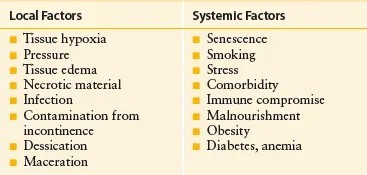The client is a 70-year-old female training for a triathlon. She was hit by a car while jogging and has an abrasion that is 25 cm by 12 cm on her right leg and a liver laceration. She underwent an exploratory laparotomy to repair the liver laceration and to search for other internal injuries.
The client has no chronic medical conditions and is in good health. She takes a calcium and magnesium supplement daily. She denies smoking or drinking alcohol.
What age-related factors may factor into this client's wound healing? Select all that apply.
Insulin resistance
Decreased epidermal turnover
Pigmentation changes
T-cell function decrease
Correct Answer : B,D
The age-related factors that may factor into this client's wound healing are: Decreased epidermal turnover: As people age, the turnover of skin cells decreases, resulting in slower wound healing. This can prolong the healing process and increase the risk of complications.
T-cell function decrease: The immune system's function, including T-cell function, tends to decline with age. T-cells play a crucial role in the immune response and wound healing. Decreased T-cell function can impair the body's ability to fight infection and promote efficient healing.
Insulin resistance and pigmentation changes are not directly age-related factors that impact wound healing. Insulin resistance is a condition related to impaired glucose metabolism and can affect wound healing in individuals with diabetes or other metabolic disorders, but it is not necessarily an age-related factor. Pigmentation changes are primarily cosmetic and do not directly affect the physiological processes involved in wound healing.

Nursing Test Bank
Naxlex Comprehensive Predictor Exams
Related Questions
Correct Answer is C
Explanation
The property of the drugs that, if shared by both, indicates a need to closely monitor the client for drug toxicity is:
Highly protein bound.
When a drug is highly protein bound, it means that a significant portion of the drug molecules bind to proteins in the bloodstream. This binding can affect the availability and distribution of the drug in the body. If two drugs are highly protein bound and administered together, they may compete for binding sites on the proteins, leading to increased levels of unbound (free) drug in the bloodstream. This can result in higher drug concentrations and an increased risk of drug toxicity.
Closely monitoring the client for drug toxicity is necessary when drugs are highly protein bound because there is a potential for increased drug levels and associated adverse effects. Monitoring for signs and symptoms of drug toxicity, as well as routine laboratory tests to assess liver and kidney function, may be necessary in these cases.
The other properties listed do not necessarily indicate a need for closer monitoring for drug toxicity:
- Low bioavailability refers to the fraction of an administered dose that reaches the systemic circulation in an active form. While low bioavailability can affect the effectiveness of a drug, it does not directly imply a need for closer monitoring for drug toxicity.
- Short half-life refers to the time it takes for half of the drug concentration in the body to be eliminated. While drugs with short half-lives may require more frequent dosing, this property does not inherently suggest a need for closer monitoring for drug toxicity.
- High therapeutic index indicates a wide margin of safety for a drug, meaning that the effective dose is significantly lower than the toxic dose. A high therapeutic index implies that the drug has a wide safety margin and is less likely to cause drug toxicity.
Correct Answer is B
Explanation
A) Incorrect - While discussing the potential for asymptomatic partners is important, addressing the client's concerns and providing accurate information is more immediate.
B) Correct- Syphilis and other STIs are important public health concerns. The nurse should provide accurate information, answer questions, and correct any misconceptions the client might have. This approach supports the client's knowledge and understanding of their health condition and prevents the spread of misinformation.
C) Incorrect - While discussing contraceptives is relevant to sexual health education, it may not directly address the client's concerns about their prior infections.
D) Incorrect - Notifying local health departments is important for reporting communicable diseases, but it doesn't directly address the client's current situation and concerns.
Whether you are a student looking to ace your exams or a practicing nurse seeking to enhance your expertise , our nursing education contents will empower you with the confidence and competence to make a difference in the lives of patients and become a respected leader in the healthcare field.
Visit Naxlex, invest in your future and unlock endless possibilities with our unparalleled nursing education contents today
Report Wrong Answer on the Current Question
Do you disagree with the answer? If yes, what is your expected answer? Explain.
Kindly be descriptive with the issue you are facing.
